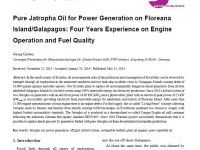Combustion and emission characteristics of a 2.2L common-rail diesel engine fueled with jatropha oil, soybean oil, and diesel fuel at various EGR-rates
Der wissenschaftliche Artikel entstand aus dem vom Bundesministerium für Wirtschaft und Energie bis 9/2017 geförderten ZIM Kooperationsprojekt „Entwicklung und Herstellung von Pflanzenölkraftstoffen und Pflanzenöl/Diesel-Mischkraftstoffen nach DIN 51623 und Praxistest von Motoren und Kraftstoffen in Flex-Fuel-Motoren am Prüfstand und im Inselnetz-Hybrid-Generatorbetrieb“. Untersucht wurde das Verbrennungs- und Emissionsverhalten eines modernen Common-Rail-Motors bei unterschiedlichen Pflanzenölen und Diesel als Kraftstoff.








